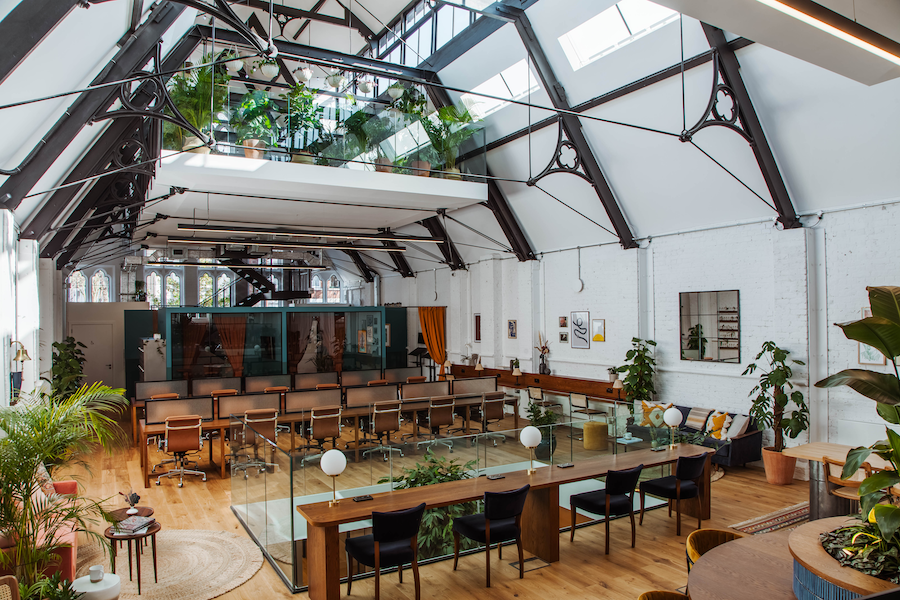- What are flexible workspaces?
- What are the key characteristics of flex space?
- What are the differences between flexible workspace and traditional offices?
- What are the benefits of flexible offices?
- Is it more expensive to rent flexible offices?
- What size company suits flex space?
- What type of businesses can benefit from flexible office space?
- How can I find a flexible office space?
Pandemic aside, flexible office space has brought about one of the biggest revolutions in real estate for over a century.
It’s been a key driver of workplace innovation in the digital age. Gone are the days of cubicle-filled offices with cables snaked across the floor. Once the 2010s hit, modern workspaces with an increased focus on wellbeing, technology and sustainability took office culture by storm.
Fast-forward to the remote work revolution, and flexible offices continue to appeal to businesses of all shapes and sizes — from global workforces to remote companies experimenting with digital nomadism.
But what makes these flexible offices so popular is the sheer amount of choice, agility and access to key locations they afford. But what exactly is a flexible workspace? What kind of businesses does it suit? And how does flexible office rental work?
As seasoned experts in the flexible workspace industry, Hubble’s outlined everything you need to know in this comprehensive article.
What are flexible workspaces?
So, what is the definition of flexible workspace?
Flexible workspace, which we may also refer to as flexi space, is an all-encompassing term for several types of workspace. Each is designed to provide employees with various places and ways to work that suit their needs.

What makes these types of workspaces ‘flexible’ is primarily their minimum terms. While traditional leases require you to sign on for 5-10 years (if not more), flexible office space requires much less commitment. Most nowadays offer monthly rolling contracts.
Here are the different types of flexible workspaces available:
Serviced offices

Serviced offices are private office spaces or executive suites that are all set up and ready to go from the day you move in.
All the building’s utilities, bills and day-to-day maintenance are managed by another company, with costs simplified into one all-inclusive monthly fee.
Shared offices

A shared office is one where multiple businesses work in the same environment and share the same facilities. For example, this could be a business centre with hot desks on every corner.
Alternatively, this could be a part-time office where a business rents a private space for the same 1-3 days per week.
Just like renting a full-time serviced office, businesses benefit from monthly rolling contracts and top-notch facilities. But the key difference is that you’re able to make significant savings on office rent.
Coworking spaces

Coworking spaces are a mix of shared office space, business centre and café. They come with a range of features beyond flexible contracts, such as community events and plug-and-play setups, making it the perfect space to get work done and network.
These flexible coworking spaces can be accessed as part of your monthly rental or via on-demand. With the latter, you typically book coworking space for the day, meaning you only pay for what you use.
Hot desks

Hot desking is an alternative to the conventional office setup. Instead of giving employees assigned desks, they show up at a coworking space and pick a free desk to work from for the day — whenever they’re needed.
What are the key characteristics of flex space?
Open-plan designs
A fundamental aspect of flexible workspaces is an open-plan layout. This innovative design choice is widespread and encourages collaboration among teams. Without grey walls and cubicles separating workstations, employees benefit from improved communication and shared natural light.
These communal spaces also make it easier to network with other like-minded professionals and feel part of a community — something many find important in a post-pandemic world of work.
Focus zones
While open-plan office layouts are designed for coworking, a side effect is that they make the space more noisy. Luckily, plenty of interior designers have mitigated this by incorporating quiet areas and focus zones so workers can crack on with minimal disruption.
These include designated quiet corners within communal spaces or building private phone booths that insulate the sound.
Adaptable workstations
Another key characteristic of flexible offices is their adaptive design. For example, you can find ergonomic furniture in communal areas and private offices to help workers work in a way that suits them best. You can also find relaxed, social areas like coffee bars and comfy breakout spaces.
Shared facilities
The facilities included with a flexible office vary from space to space. But in general, they typically include all your office essentials such as furniture, cleaning services, high-speed internet and security staff, to name a few.
On top of this, most flexible workspaces offer additional amenities on top of these, including:
- Meeting rooms
- Breakout space
- Rooftop terraces
- Kitchens
- Pet-friendly access

- Gym facilities
- Shower rooms
- Bike storage
- Fitness and wellness classes
- Event space
Usually, businesses can use these facilities as part of their all-inclusive rental package or if teams have booked the space for the day. However, one exception is meeting rooms, which some providers charge on a pay-as-you-use basis.
What are the differences between flexible workspaces and traditional offices?

| Flexible Workspace | Traditional Offices |
| Shorter minimum terms As mentioned, flexible workspaces offer short terms that typically roll monthly, allowing businesses to adapt quickly. | Long-term contracts Most traditional office contracts range from 5-10 years — and also require hefty exit fees. For established businesses, it’s typical to acquire legal advice before signing this type of contract. |
| Open and collaborate layout Characterised by an open and adaptable layout, flexible workspace often features shared workspaces, hot desking, and collaborative areas. The design is more conducive to creative brainstorming and problem-solving. | Hierarchal layout Traditional offices tend to have fixed and assigned desk layouts. There’s usually a set structure where there’s a clear hierarchy. This setup helps clarify who does what and gives more control over decision-making from a central point. |
| Ready-to-go With flexible office rentals, everything you need is ready from the day you move in. The flexible workspace operator decides on the furniture and facilities, while you have some control over office decor. | Ability to brand With traditional office space, businesses have more creative freedom over the space. This could be decorating the office with company branding or deciding what facilities to include — often seen with managed offices. |
| Increased visibility Working in a collaborative space with other businesses means networking opportunities are plentiful. You can find freelancers to hire, collaborators to join forces with, and even potential customers to help grow your business. | Limited networking opportunities Traditional offices may be contained to the business and its employees. This means that opportunities to network with other businesses and professionals may be limited. |

What are the benefits of flexible offices?
Hassle-free
Flexible office spaces are renowned for their hassle-free nature. From ensuring the WiFi works to cleaning the entire building, a separate party will deal with all the day-to-day maintenance.
Speed of move-in
With flexi space, turnaround times are much faster. You can sign a contract and move into a fully functioning office in a matter of weeks if not days. At Hubble, we’ve even helped companies find and move into a serviced office in less than 24 hours!
Cash flow
As you pay an all-inclusive fee each month, budgeting comes easy. With fixed rates and no surprise bills to worry about, flexible workspaces give businesses greater control over their cash flow and allow them to focus on more important matters.
This is also the case for businesses renting part-time offices or accessing workspace on-demand.

Agility
Flexi space gives businesses much more agility when it comes to catering to rapidly evolving customer and market expectations.
Whether you’re a startup with a growing headcount or a more established business that’s decided to distribute teams across multiple locations, the flexible contracts give you space to grow, shrink, or diversify at your own pace.
Better collaboration
Flexible workspace can promote teamwork amongst your employees. Amenities such as breakout spaces and meeting rooms are perfect facilitators for organic conversations and brainstorms—helping boost team morale, bonding, and productivity.
High-quality workspace
Many flexible offices provide high-quality facilities, such as event space, baristas, and gyms, that businesses wouldn’t otherwise have access to. This can be hugely helpful in attracting and retaining talent.
More equal opportunities
The benefits of flexible office space can extend beyond businesses to society as a whole. Research conducted by the Government-backed Behavioural Insights Team reveals that flexible roles can enhance equal opportunities, with a 20% increase in women applying for senior positions.
Is it more expensive to rent flexible offices?
Once written off as a fad, flexible office space is multiplying in terms of both popularity and supply. Pre-Covid, flex space was predicted to account for 30% of all office stock by 2030.
But with the remote working revolution, this growth is expected to happen even faster — helping boost workplace productivity and the economy.
London’s flexible workspace sector is booming. It’s currently the flex capital of the world, with more than 17.1m sq ft of flexible workspace at the beginning of 2020. That’s over 7% of its total office stock. Ten years before, that figure was sitting at just 1.9%.
So, it’s clear there are economic benefits of coworking due to the sheer demand for it. But how expensive is it for businesses to rent these flexible spaces?

The short answer? It depends on what your plans are.
When you rent a flexible workspace, you’ll pay a slight premium on rent in exchange for zero hassle and competitive facilities. But since you can grow, shrink or even ditch the office altogether at a month’s notice, rather than being tied in for 5-10 years, you’ll only ever pay for the space you need at any one time.
In that sense, flexible office space can often work out much more economically.
What size company suits flexible office space?
Flex workspace is valuable to businesses of all sizes because of the choice and flexibility it offers. So, whether you’re a startup, scaleup, SME or corporate, there’s bound to be a flexible workspace solution that’s right for you.
Not sure where to start? We can help. If you’d like to learn more about what flexible workspace solutions are available to your business now, get in touch.
What type of businesses can benefit from flexible office space?
Before the pandemic, flexible office spaces were well-suited to freelancers, startups, and established businesses looking to build their brands but still enjoy the comfort of short-term leases.
But now that ‘flex’ has taken office culture by storm, flexible office solutions can benefit businesses of any size and calibre. For example, bigger organisations who’d like to downsize their office footprint can incorporate flex spaces into their workspace strategies, allowing employees to tap into local workspaces as and when they need it.
How can I find a flexible office space?
Our flexible workspace platform can help you find the perfect workspace solution for your business — whether that’s a longer-term office or on-demand access to thousands of flexible spaces to work and meet.
We’ve built the UK’s largest online marketplace for office space, allowing you to search and compare the flexible office market. Our solutions flex with your workspace needs, helping you reduce wasted office spend while keeping your employees happy and productive.

If you’re looking for a full-time office, our expert advisors are here to help. Thanks to our strong relationships with top workspace providers, they’ll manage your entire search and work to get you the very best rate.
For those looking to make substantial savings without losing the magic of in-person working, Hubble also offers Part-Time Offices for your team to use for the same 1-3 days per week.
And if you’re looking for even more workplace flexibility, Hubble On-Demand lets you and your team book flexible workspaces by the day or hour. You only pay for what you use, making it a perfect choice for remote businesses looking to give their teams great places to work.
